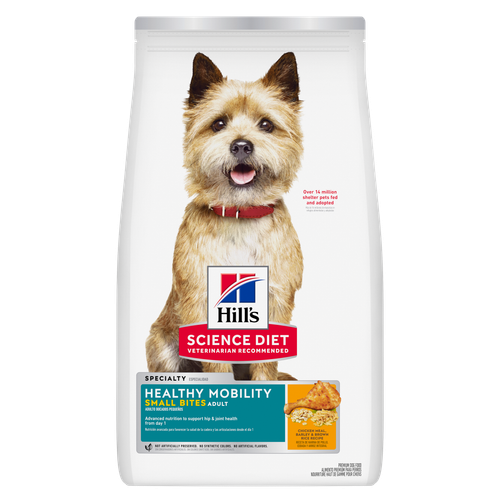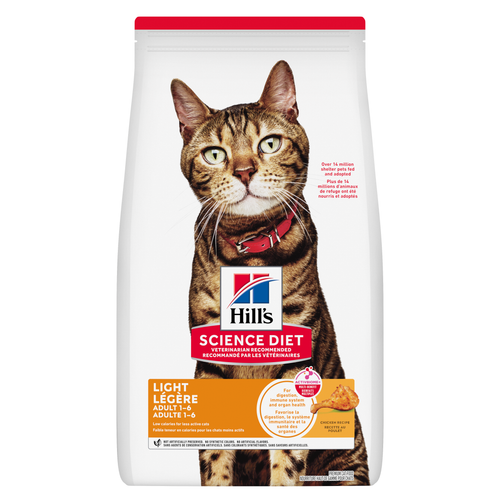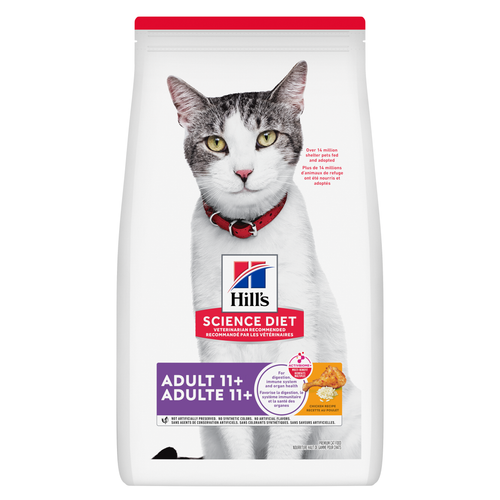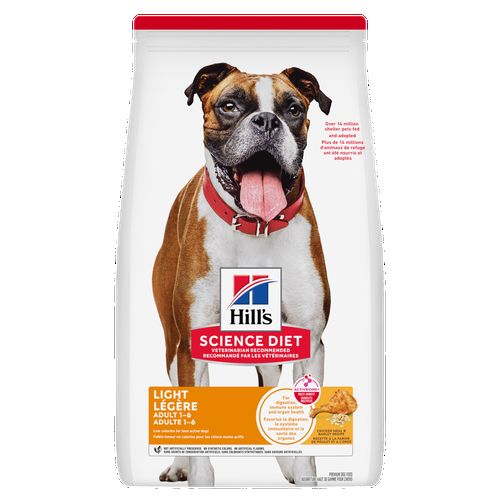
-
Find the right food for your petTake this quiz to see which food may be the best for your furry friend.Find the right food for your petTake this quiz to see which food may be the best for your furry friend.Featured products
 Adult Healthy Mobility Small Bites Chicken Meal, Barley & Brown Rice Recipe Dog Food
Adult Healthy Mobility Small Bites Chicken Meal, Barley & Brown Rice Recipe Dog FoodAdvanced nutrition to support hip & joint health from day 1
Shop Now Adult Sensitive Stomach & Skin Small & Mini Chicken Recipe Dog Food
Adult Sensitive Stomach & Skin Small & Mini Chicken Recipe Dog FoodHill's Science Diet Sensitive Stomach & Skin Small & Mini dry dog food is tailored nutrition for Small & Mini dogs while being gentle on stomachs. Nourishes skin & promotes a lustrous coat.
Shop Now Adult Light Large Breed Chicken Meal & Barley Recipe Dog Food
Adult Light Large Breed Chicken Meal & Barley Recipe Dog Food18% lower calories vs. Science Diet Large Breed Adult
Shop NowFeatured products Adult Light Chicken Recipe Cat Food
Adult Light Chicken Recipe Cat Food20% lower calories vs. Hill's Science Diet Adult
Shop Now Adult Healthy Cuisine Seared Tuna & Carrot Medley Cat Food
Adult Healthy Cuisine Seared Tuna & Carrot Medley Cat FoodDelicious seared tuna paired with tender carrots in a mouthwatering sauce
Shop Now Adult 11+ Chicken Recipe Cat Food
Adult 11+ Chicken Recipe Cat FoodSupports brain health & beautiful fur. Helps keep immune system, heart & kidneys healthy.
Shop Now -
Dog
- Dog Tips & Articles
-
Health Category
- Weight
- Food & Environmental Sensitivities
- Urinary
- Digestive
- Joint
- Kidney
- Dental
- Cancer
-
Life Stage
- Puppy Nutrition
- Adult Nutrition
- Senior Nutrition
Cat- Cat Tips & Articles
-
Health Category
- Weight
- Skin & Food Sensitivities
- Urinary
- Digestive
- Kidney
- Dental
- Stress
- Cancer
-
Life Stage
- Kitten Nutrition
- Adult Nutrition
Featured articles Antioxidants
AntioxidantsUnderstand the importance of antioxidants in your dog or cat's food, and how they can help protect your pet and keep them healthy.
Read More Water
WaterDiscover why water is the most important nutrient for your dog or cat to live a healthy life. Find out how much water your pet should consume each day.
Read More Importance of DHA in your Pet's Food
Importance of DHA in your Pet's FoodLearn about DHA, Docosahexaenoic Acid, a natural omega-3 fatty acid that is essential in the development of the brain and nervous system in cats & dogs.
Read More -


You wake up one morning to see that the half-full glass of wine you accidentally left out the night before is now empty, and no one is at home except for you and your pup — it's clear that your dog is the likely culprit that drank the alcohol. Questions race through your mind: Is your dog intoxicated? Does he have alcohol poisoning? Do you need to bring him to the veterinarian?
Hopefully, you'll never be in this situation, but knowing the risks involved and the steps to take if your dog were to ever sneak a sip can help keep your pup safe.
What Happens When a Dog Drinks Alcohol?
Just like chocolate and onions, alcohol is toxic to dogs. Even small amounts of alcohol — not only in drinks but also in syrups and raw bread dough — can have ingredients that are poisonous for them. Both ethanol (the intoxicating agent in beer, wine and liquor) and hops (used to brew beer) can cause dogs alcohol intoxication. Signs of intoxication can include:
- Vomiting
- Disorientation
- High body temperature
- Restlessness
- Excessive panting
- Muscle tremors and seizures
In severe cases, or if left untreated, alcohol intoxication in dogs can cause failure of the organ systems and even death.

Is It Ever OK to Let My Dog Have a Sip of My Drink?
While it might seem harmless to let your dog take the tiniest sip of your wine, beer or mixed drink, the bottom line is that it's never OK to let your dog drink alcohol. It's never acceptable to put his health at risk, no matter how amusing it may seem at the moment. As a pet parent, it's your responsibility to keep your pooch safe, and that includes keeping him away from alcohol.


Tasty Tips
What Should I Do If My Dog Accidentally Drinks Alcohol?
If despite your best precautions, your dog somehow drinks alcohol, the first thing you should do is alert your vet and get recommendations on how to proceed. Depending on the alcohol content and the amount they consumed, some vets might ask you to take your dog in for a checkup immediately; others may suggest waiting it out to see if your dog has a reaction before coming in.
Usually, if your dog drinks more than one small sip of alcohol — or, if you don't know how much he drank — it's best to bring him to the vet right away. If the vet's office is closed, you should head to an emergency veterinarian center. A dog with alcohol poisoning needs to be treated immediately. You'll want to call your vet or the emergency clinic on your way there to let them know that your dog accidentally drank alcohol; that way, a vet can be ready for you as soon as you arrive.
Preventing Your Dog From Drinking Alcohol
Here are some basic tips to prevent your dog from consuming alcohol in the future.
- Keep all forms of alcohol stored out of reach of your dog: Whether in a refrigerator, in a cabinet, or stored up, hiding your alcohol will prevent a curious pup from sinking his teeth into a can or knocking over a glass bottle.
- Do not leave alcoholic beverages unattended: If you walk away from your glass for some reason, make sure that it is out of reach to prevent him from taking a couple of laps before you return. Make sure to throw out or put any left over alcohol in the fridge before going to bed at night.
- Talk to your guests: If you are having a social gathering around your dog, make sure they all understand that it is not okay to give your dog a drink at any time. In the cases where you or any guests might be heavily intoxicated and might forget this advice, it might be best to lock your dog in a secure area away from guests to avoid any accidental alcoholic consumption
- Spills: In the case of spills be sure to get your dog away from the accident as quickly as possible and worry about cleaning up after. While a wine-stained rug can be replaced, your dog cannot.
Now that you know what happens when a dog drinks alcohol, do all you can to keep your pooch away from liquor at all times. No matter how curious Fido gets, it's never OK to share! If an accident does happen, though, now you'll know what to do.


Erin Ollila believes in the power of words and how a message can inform—and even transform—its intended audience. Her writing can be found all over the internet and in print, and includes interviews, ghostwriting, blog posts, and creative nonfiction. Erin is a geek for SEO and all things social media. She graduated from Fairfield University with an M.F.A. in Creative Writing. Reach out to her on Twitter @ReinventingErin or learn more about her at http://erinollila.com.
Related products

18% lower calories vs. Science Diet Large Breed Adult

Advanced nutrition to support hip & joint health from day 1

18% lower calories vs. Science Diet Adult

Hill's Science Diet Sensitive Stomach & Skin Small & Mini dry dog food is tailored nutrition for Small & Mini dogs while being gentle on stomachs. Nourishes skin & promotes a lustrous coat.
Related articles

Learn basic steps & precautions for treating a cut on your dog, including what you can put on the cut, and when you should take them to the vet.

Your dog's coat and skin are a big part of your dog's overall health. Ensure you keep your dog's coat healthy, by following these simple tips.

Discover how the field of dog science is giving us more and more insights into the inner workings of our furry best friends.

Learn how dogs with sensitive skin can have special dietary needs, how they can develop over time in a healthy dog, and how Hill's dog food can help.

Put your dog on a diet without them knowing
Our low calorie formula helps you control your dog's weight. It's packed with high-quality protein for building lean muscles, and made with purposeful ingredients for a flavorful, nutritious meal. Clinically proven antioxidants, Vitamin C+E, help promote a healthy immune system.
Put your dog on a diet without them knowing
Our low calorie formula helps you control your dog's weight. It's packed with high-quality protein for building lean muscles, and made with purposeful ingredients for a flavorful, nutritious meal. Clinically proven antioxidants, Vitamin C+E, help promote a healthy immune system.

